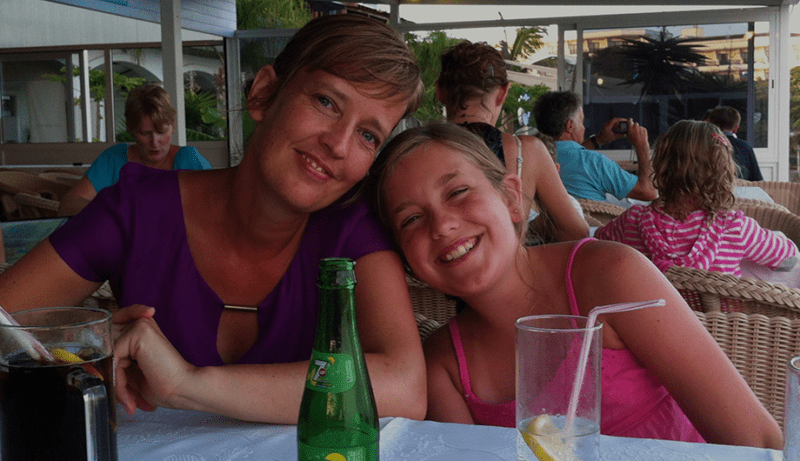
“You don’t have to do it alone as a young carer” – Chloe’s story
Chloe shares her experience of being a young carer for her Mum, who was diagnosed with frontotemporal dementia at 47, and died aged 51.
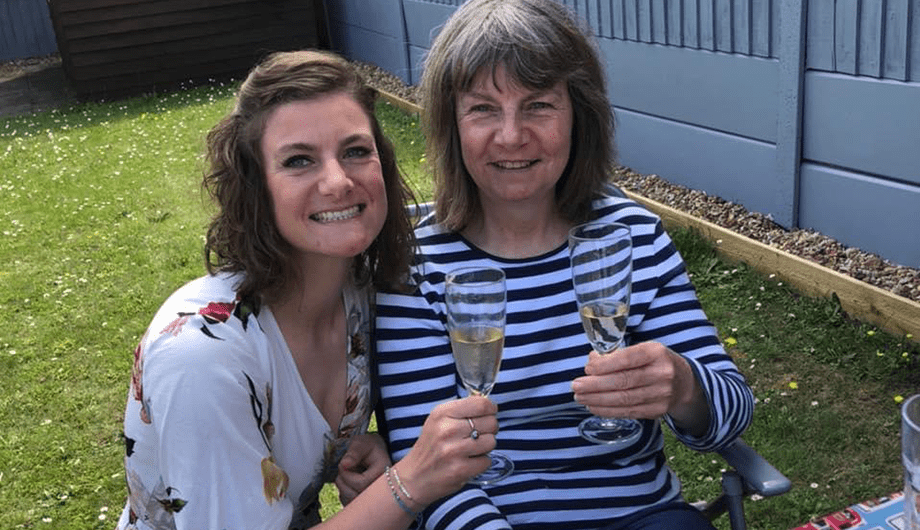
When Rosie’s mum, Dawnie, was diagnosed with young onset Alzheimer’s disease, her employer ensured caring responsibilities were fully supported.
Dawn, or Dawnie as we called her, was the best Mum I could have ever asked for. She had three children – my brother, sister and I, all under the age of five. I don’t know how she did it, but she raised us with so much love and support. Growing up, she actively encouraged us to attend all sorts of clubs, like swimming, drama, Brownies, Cubs, piano lessons, choir, football, gymnastics and horse riding to ensure that we experienced a great variety in our lives and experience the best childhood that we could. I honestly do not know how she managed to find the time to take all three of us to such a wide range of different activities after school and at the weekends. She encouraged us all to find the adventure in life, as she’d always done.
She was a keen motorcyclist in her younger years, and worked in a variety of roles throughout her career. She was a trained chef, did child-minding, worked as a teaching assistant, a support worker and always made time to volunteer for the Red Cross. She loved learning new things and meeting new people.
When I was 15 years old, Dawnie bought a horse, who we called Mr Bud. Oh, how we adored him. In a sense, Mr Bud brought me even closer to Mum – he was like a glue in our relationship. She was at her happiest out in nature, atop Mr Bud.
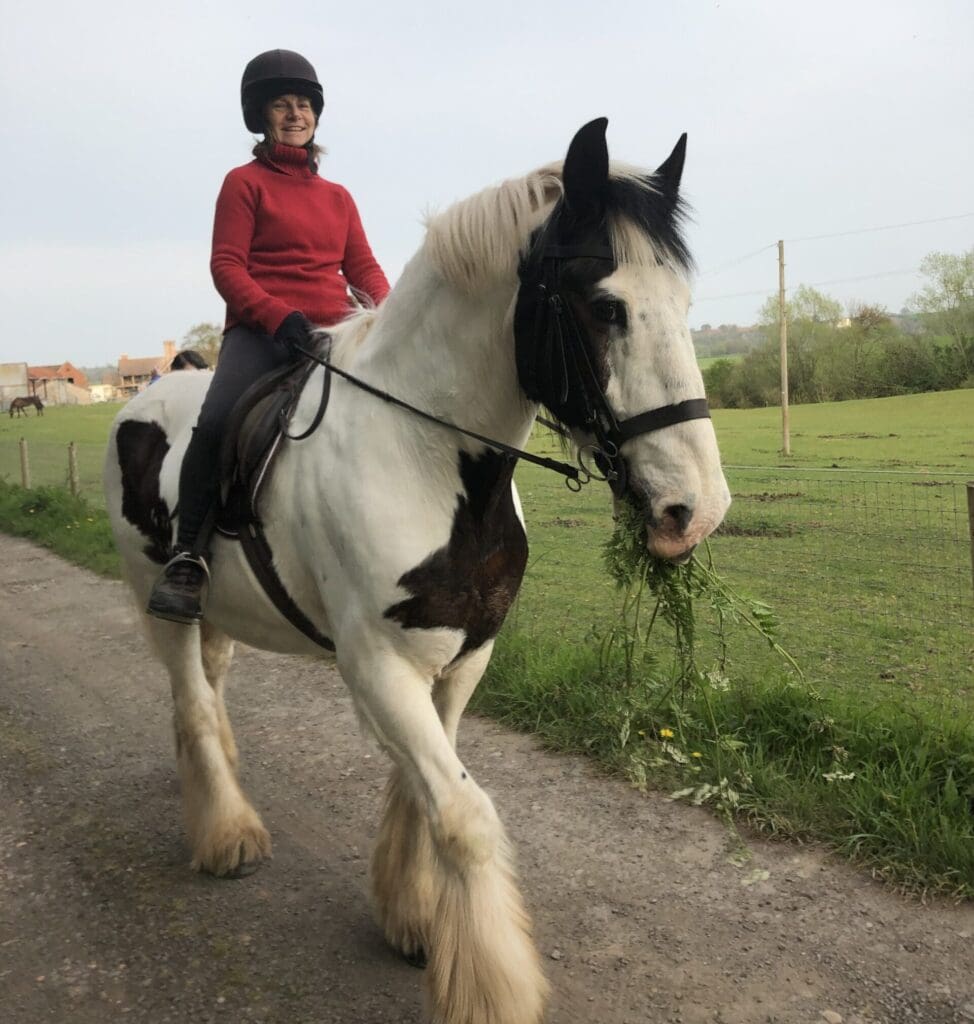
Dawnie atop Mr Bud
When Dawnie was in her mid-50s, we began to notice changes in her behaviour. She began to struggle with things she’d previously done with ease. And some of these involved handling Mr Bud. She would forget to fill up his water, which was totally out of character for her. Or she’d have trouble putting his bridle on, despite him being the most placid horse you’d ever meet! She also had issues cooking meals, even though she was a trained chef. In 2018, when Dawnie was 58, my brother Jake and I, decided we need to get some professional help.
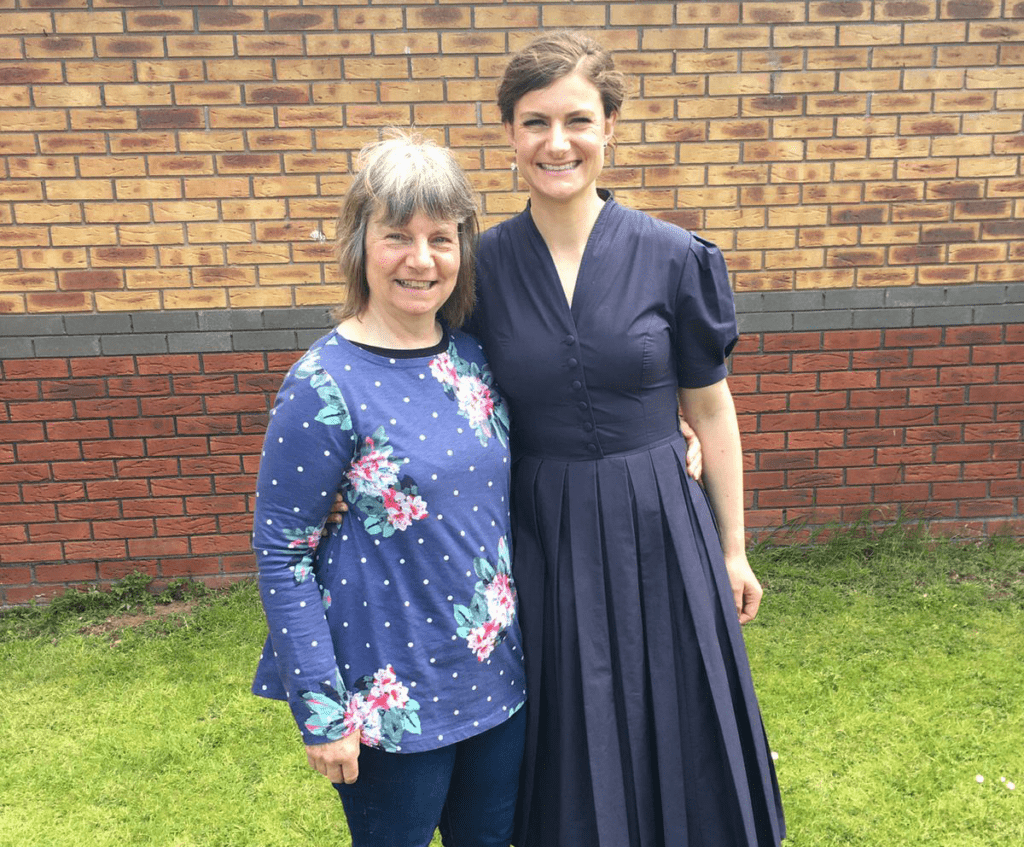
Dawnie and Rosie
What followed was 18 months of appointments and assessments, long waiting times, and a lot of frustration. We began to do our own research, and were becoming more convinced that it might be a form of dementia. But a formal diagnosis wasn’t forthcoming.
At this time, the Dementia UK Admiral Nurse Helpline was an incredible support for me. Being able to call, on my schedule, and just having someone who understood dementia on the other end of the line meant the world. The stress of not getting answers from medical professional, and adjusting to life as a carer was all just becoming too much. I vividly remember crying on the phone to an Admiral Nurse multiple times.
In 2019, Dawnie had a memory clinic appointment in March and was finally diagnosed with young onset Alzheimer’s disease shortly after, a few months before her 59th birthday. I was 33 years old and Jake was 32.
It’s hard to describe what was running through my head at the time. In one sense, I was relieved that we finally had an answer. Then came the devastation with dementia being a life-limiting condition. And throw in an undercurrent of stress about what to do next and how I could be there for Dawnie whilst still juggling my career.
I was working full-time for the Royal Air Force as a Human Resources Officer. I’d worked for the RAF for nine years, and I absolutely loved my job.
Even though I wasn’t deployed overseas when Dawnie’s symptoms were becoming more severe, my role involved being stationed at units in the UK that weren’t particularly close to home. This was causing me so much stress, and a lot of guilt as well. I knew it was time to talk to my line manager.
Leading up to this meeting, I couldn’t help but catastrophise about what was coming. I struggled to see a way that I could juggle full-time work with the caring responsibilities I was increasingly having to take on. The reality was, I thought disclosing my situation would be followed by a conversation about having to leave the organisation. I’ve never been so relieved to be so wrong.
Not only was there no talk of losing my job, the conversation immediately turned to flexible working options that ensured I could be there for Dawnie. This involved adjusting my work days, and locations, so that I could take her to every appointment she needed to be at. I was also linked up with a counselling service through the RAF Benevolent Fund, and I found this hugely helpful. My counsellor actually had direct experience caring for her mum with dementia as well.
I’ll be forever grateful for how supportive my workplace was at this time. They showed genuine empathy for me as a person, beyond being an employee. While Dawnie’s final years were incredibly hard to navigate, we were able to create memories in her final years that I never thought we would be able to. Jake and I took her on a helicopter flight to see Mr Bud in the field. We did a birds of prey handling experience. Went on a holiday to Devon. Visited Cadbury World. And many outings for mocha coffee and cake – her favourite. This meant the world.
Dawnie died in April, 2024, approximately five years after her diagnosis.
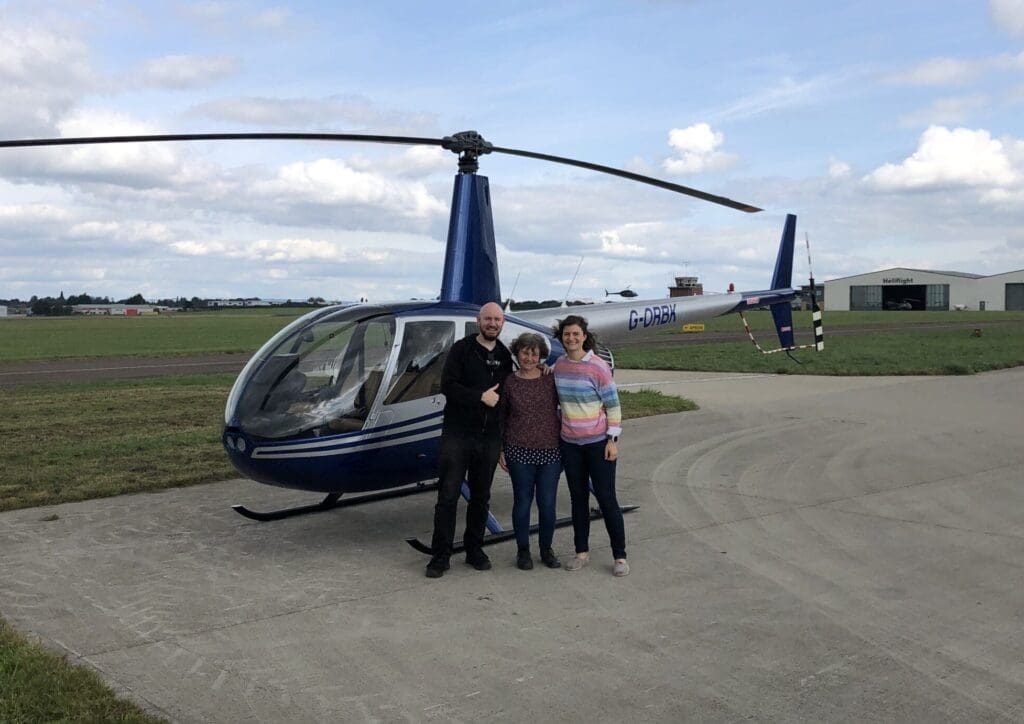
Jake, Dawnie and Rosie before their helicopter ride
The range of skills you develop as a carer are just unbelievable. It’s not a skillset you expect, or want, to build, but the benefit to the employer can be huge. I learnt so much caring for Dawnie that it actually influenced a career pivot for me. Because I was taking postings closer to where she lived, I took on some roles I wouldn’t have otherwise done. These were more in the area of employee welfare, and I found myself surprised by how much I enjoyed these roles. I loved the multidisciplinary nature of them, working with mental health professionals and just trying to be there for people navigating hardship. I found myself using so many of the things I’d learn caring for Dawnie.
Even though Dawnie has now passed away, I still want to use these skills. I’m currently studying to retrain as an Army Mental Health Nurse, a completely unexpected career choice that caring for Dawnie has led me to. Something that I feel extremely privileged to have the opportunity to undertake. I am excited to be able to put my experience and skillsets into good use through a rewarding career change to help others in their time of need.
Nearly 24 years on from when we first got him, Mr Bud is still with us. He’s obviously quite old and not as active as he once was, but every time I see him, I think of Dawnie. I think of the memories we created. Of her infectious smile and kind nature. And how I hope she’d be proud of the woman I’ve become.
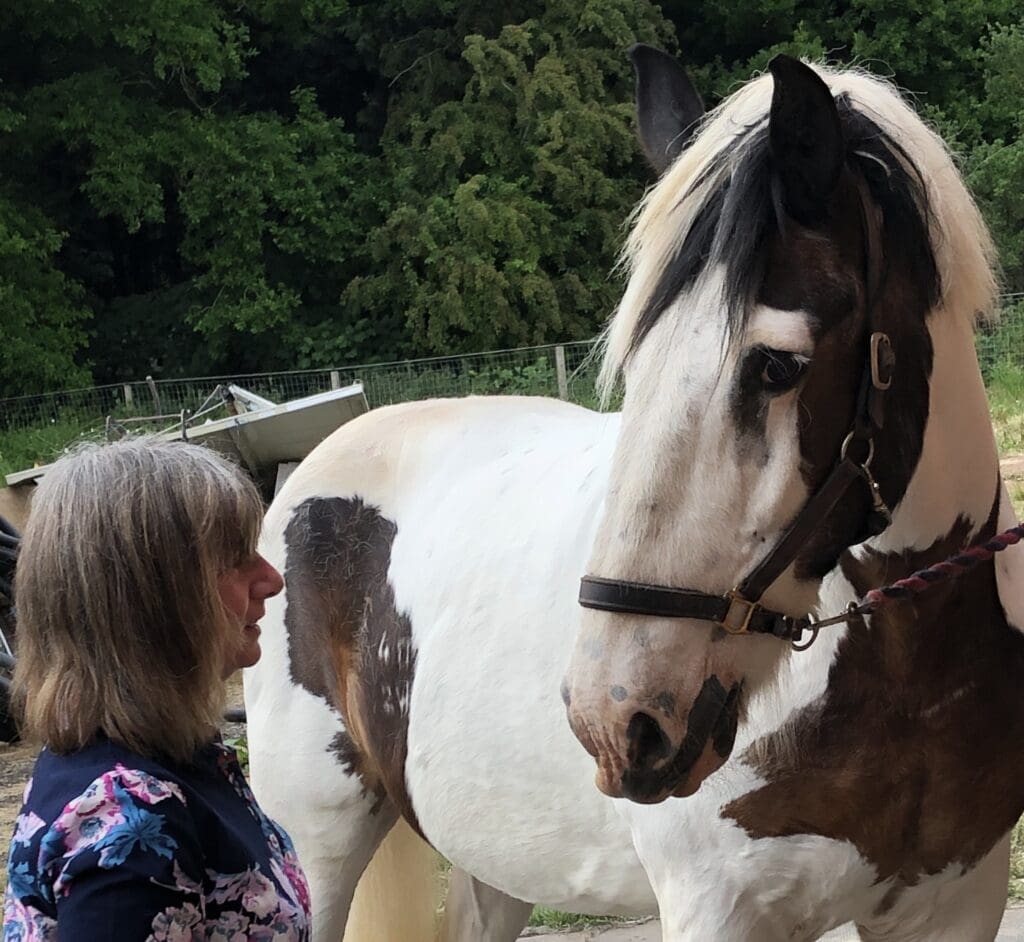
Dawnie shares a moment with Mr Bud
If, like Rosie, dementia is impacting your working life, we are here to support you. Learn more about our Dementia at work programme and how we can help.

Chloe shares her experience of being a young carer for her Mum, who was diagnosed with frontotemporal dementia at 47, and died aged 51.

Glenn shares how flexible working arrangements and support from his managers enables him to continue working whilst prioritising his wife Helen's care.

Phil highlights the difference it makes when someone living with dementia receives appropriate support in the workplace. He urges employers not to "write someone off" because of their diagnosis.